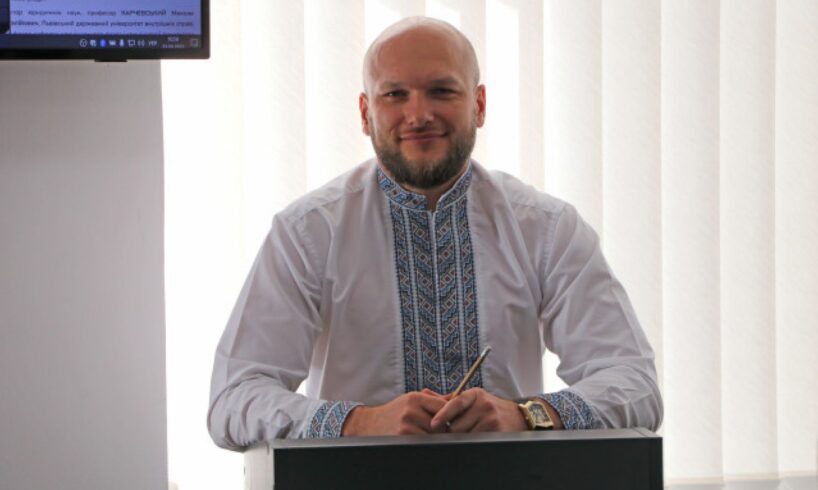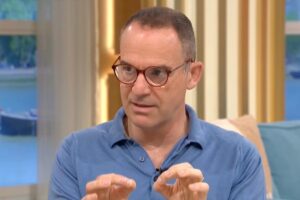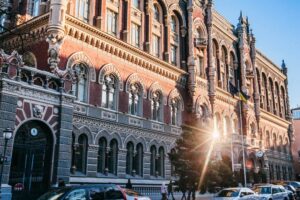
The nominee to lead Ukraine’s economic crimes bureau says he’s prepared to take legal action against the government, as the Cabinet of Ministers continues to block him from assuming his post.
The government had until July 31 to appoint a new head to the bureau as part of a loan agreement with the International Monetary Fund, but has rejected a candidate nominated by an independent selection committee since late June over alleged Russia ties.
Critics have called the move politically motivated and unlawful, while Ukraine’s Western partners have called on the government to select a head to the agency as part of its anti-corruption commitments.
The nominee — anti-corruption detective Oleksandr Tsyvinsky — told the Kyiv Independent that “there will definitely be a fight, using all available legal means.”
“That kind of fight has defined the past 10 years of my life — I’m quite hardened in this regard,” he said, adding that while he understands perfectly well that going to court could be a lengthy process.
Protestors demanding that the government repeal a law passed last week, granting the Prosecutor General sweeping control over key anti-graft bodies, also questioned why there was still no head of the bureau. Created in 2021 to investigate economic crimes, the bureau has been accused of inefficiency and political meddling.
In addition to a requirement under its IMF loan program, reforming the bureau is also part of Ukraine’s broader reform commitments under its EU accession process.
“(Prime Minister Yuliia) Svyrydenko still violates the law and does not appoint the head of the bureau, despite direct and unambiguous signals from the EU and IMF,” opposition lawmaker Yaroslav Zhelezniak wrote on Telegram on July 31.
Following street protests, Zelensky signs law restoring independence of anti-graft bodies
The bill aims to reverse legislation passed last week that effectively destroyed the independence of the National Anti-Corruption Bureau (NABU) and the Specialized Anti-Corruption Prosecutor (SAPO).
According to the laws creating the bureau, Tsyvinsky should have taken the reins of the bureau 10 days after a committee selected him as the winner on June 27. But on June 30, the Cabinet of Ministers overruled the decision after receiving a letter from the Security Service (SBU) noting that Tsyvinsky’s estranged father has Russian citizenship — information that was known to the selection committee when it was considering his candidacy.
Members of the committee told journalists during a press briefing on July 30 that they don’t see the citizenship of Tsyvinsky’s father as a risk. The seasoned investigator has passed vetting processes and has two decades of experience in law enforcement.
One committee member, James Wasserstrom, expressed frustration during the briefing that the letter came only after the committee selected Tsyvinsky, despite requesting information from the SBU on the candidates’ backgrounds back in April.
After his candidacy was rejected, Tsyvinsky requested the letter sent to the Cabinet of Ministers by the SBU, only to receive a written response that by July 31, the SBU had destroyed it, Tsyvinsky wrote on Facebook. This sparked further reprisal from Brussels.
“We consider this to be blatant manipulation and evidence that the Security Service of Ukraine has no information about the real risks of appointing Tsyvinsky,” the European Commission said in a letter to Prime Minister Svyrydenko, seen by the Kyiv Independent on July 31.
Ukraine’s Bureau of Economic Security, known by its Ukrainian acronym BEB, showed up at the doors of the !Fest restaurant group’s office in the western city of Lviv on Oct. 17, 2023. (BEB)
A source in the SBU told the Kyiv Independent that burning documents is “a general practice of correspondence” between government bodies during martial law. Tsyvinsky says this is only the case if a document has no value, suggesting that the letter no longer contains relevant information.
“When the only document upon which the government made its decision has been destroyed, no one will be able to see it anymore. Even if someone describes its content, it holds no legal weight. If the letter is gone, then the allegations no longer stand. Or they were not substantiated,” he said.
He is unsure why his appointment was blocked, but says he will find the missing pieces of information before going to court. Anti-corruption figures have been more outspoken, saying that the government doesn’t want someone independent like Tsyvinsky, who has a decade of experience working with the National Anti-Corruption Bureau (NABU).
“As Tsyvinsky is from NABU, there could be a strong alliance between NABU and the Economic Security Bureau, which is obviously quite dangerous for people who are trying to steal something during the full-scale war,” Zhelezniak told the Kyiv Independent on July 28.
Tsyvinsky’s nomination coincided with accusations of corruption against former Minister Oleksii Cheryshov, part of President Volodymyr Zelensky’s inner circle, over a land-grab case on June 23. The following month, the government began cracking down on anti-corruption institutions, including renowned activist Vitaliy Shabunin.
Shortly after, the government attempted to strip NABU and the Specialized Anti-Corruption Prosecutor (SAPO) of their independence on July 22. Immediate backlash from both the Ukrainian public and international partners forced Kyiv to backpedal.
It is not clear what the next steps are if the government does not appoint Tsyvinsky. The Kyiv Independent reached out to Prime Minister Svrydenko’s team, but did not receive a response at the time of publication.
The selection committee told reporters that they will not hold another competition and stand by the decision to appoint Tsyvinsky.
There has been no fully-fledged leader of the bureau since former head Vadym Melnyk stepped down of his own accord in April 2023.
Ukraine’s parliament approves nearly $10 billion defense spending boost
The amendment to the 2025 budget raises total defense and security spending to an estimated $50 billion, or 26% of Ukraine’s GDP.





